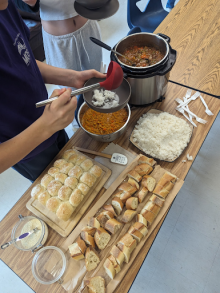
The following article was written by Brett Lofgren, MYP English Teacher.
Food journalist Michael Pollan argues, “We are the species who cooks. No other species cooks. And when we learned to cook, we became truly human.” Not only does cooking separate us from many other animals, but it’s historically brought a wide variety of people together; whether it’s hunter-gatherers sharing around a fire, families observing a tradition or holiday with a special meal, or bringing a group of high school students together, food has helped humans build community for as long as we’ve been Homo sapiens.
Over the last two school years, students in Grades 9 & 10 have experienced four different Wednesday excursions that were not only culinary explorations but also deep dives into the bonds formed by communal eating and the lessons of sustainability and history embedded within our food practices.
A Taste of Fire and Evolution
The first of these adventures took the students along the Boise River, where they engaged with the primal element of fire. Inspired by Michael Pollan’s insights in his documentary series, Cooked, on how fire catalyzed human evolution, students sustainably harvested wood and gathered around flames to roast marshmallows. This activity wasn’t just about enjoying roasted dessert; it was a lesson in the responsible use of natural resources and an experience of the warmth and camaraderie that fire has brought to human gatherings through the ages. Our adventure continued as we visited BBQ4Life and questioned a real pitmaster about what makes BBQ special—scientifically, historically, and socially.
From Pots to Sharing
In the second episode of Cooked, Pollan discusses the use of pots and their role in fostering communal dining. Taking this lesson to heart, the students prepared a large stew and the traditional Indian dish, dahl. This wasn’t just a cooking lesson; it was an exercise in teamwork and a chance to serve a meal they made to their peers, thus understanding the joy of sharing and the community-building power of cooked food.
Bread: The Staple of Civilization
On their third field trip, after watching Pollan discuss bread’s role in early civilizations, the students tried their hands at baking their loaves. This experience was supplemented by a visit to Gaston’s Bakery where they saw professional bakers at work, learning about the art and science of milling wheat and bread-making. This trip highlighted not just the process of creating food but also the historical and cultural significance of bread in bringing communities together. English 10 students were able to make an added connection to our Frankenstein unit by analyzing how scientific ethics are connected to our food industry.
Bacteria Forms Communities, Too
The final field trip revolved around the fascinating world of fermentation. After learning about the significant role fermented foods play in our diet, students teamed up with Idaho Kombucha to make their flavorful brew. This activity provided a hands-on understanding of microbiology and the patience required in the fermentation process, while also emphasizing the importance of local artisans in sustaining food traditions. Students in The Big History Project also helped by foraging rose hips from The Boise River and boiling them into a reduction to flavor our kombucha. This would help them understand the labor hunter-gatherers performed in their communities.
Throughout these experiences, students not only learned practical skills but also the underlying ethics of food consumption, including the sustainability of food sources and the effort required to maintain a functioning society. As 9th-grade student Jane Darrington reflected, “The act of cooking together helped me recognize the importance of community in food.” This sentiment captures the essence of their journey—a realization that food is more than sustenance; it is a communal bond, a shared responsibility, and a collective heritage.
These field trips at Riverstone International School exemplify how our educational philosophy goes beyond conventional learning. By engaging with the world of food, students experienced firsthand the intersections of culture, history, and community, preparing them to be conscientious citizens of the world.
.png)


.png&command_2=resize&height_2=85)


















